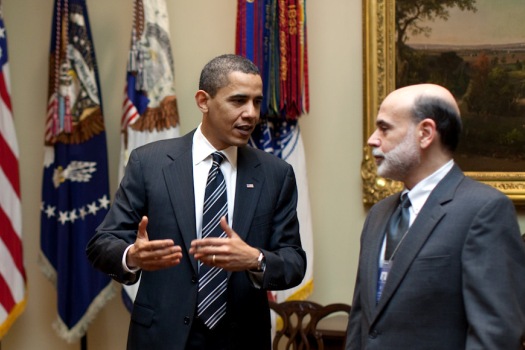Technology & Innovation
All Stories
Long-time veteran White House correspondent Helen Thomas is retiring in the wake of comments she made at a recent celebration of the Jewish Heritage at the White House. When Rabbi […]
Greenbiz.com founder and editor Joel Makower stopped by the Big Think offices today to talk about the business of sustainability. He brought up an interesting point: many of the largest […]
Google’s new translation tools are helping to make a truly universal Internet by translating pages into 57 different languages; the company is developing photo and voice recognition, too.
Gary Becker and Richard Posner weigh in on African development, which has weathered the current economic storm better than any advanced economy. Will Africa finally take off?
Those who worry that the Internet promotes mediocrity should consider the printing press, says Clay Shirky: pulp writing accompanied peer reviewed science and booming literacy rates.
The bad name given to corporate oversight, i.e. government regulation, deligitimizes its role in society and makes ready financial crises; among other things, regulators deserve more pay.
Central America’s employment of low-skilled workers could not withstand a fully developed Chinese labor market where agricultural mechanization would spur mass migration to cities, reports The Guardian.
Nicolas Carr tells The Atlantic that the Internet has changed our way of life, sometimes for the worse. Today we are a distracted and anxious society because of our voracious appetite for information, Carr says.
According the latest government numbers, the economy added 431,000 jobs in May. It’s the biggest single month increase in employment in a decade and the fifth month in a row […]
When it comes to business sustainability, do we need top-down or bottom-up approaches? Erik Rasmussen, CEO of the think tank Monday Morning and founder of the Copenhagen Climate Council, believes […]
The official unemployment rate remains almost 10%. That in itself is nearly as high as it has been since the early 80s and is plenty bad enough. But it nevertheless […]
When designer Katie Salen was teaching at the University of Texas a decade ago, she came upon a novel teaching method while trying to help her students understand online interfaces […]
Juliet Schor, a professor of sociology at Boston College, came in yesterday to talk about the new business as usual. What’s going to bring us out of the current recession? […]
“Are we more or less likely to lie to someone if we are communicating via email or text message than if we are speaking face-to-face?” asks Professor Jeff Hancock of Cornell University.
The digital divide is about more than access to the Internet, say experts. The white Anglo-Europeans who program the Web may set culturally exclusive parameters on the experience.
Because of the climate crisis created by wealthy countries, developing countries could be pushed to slow their development. Would that be fair? Charles Ebinger, Director of the Energy Security Initiative […]
Dan Ariely, the author of “Predictably Irrational ” and “The Upside of Irrationality ” stopped by Big Think’s offices yesterday to talk a little about the findings in his new […]
New technologies are turning smart phones into credit cards and cash registers, but as usual, there are trust issues and people are nervous about abandoning their wallets all together.
“While taking a more relaxed attitude towards the pursuit of wealth may make sense as a personal philosophy, it is an uncertain guide to public policy,” says the Financial Times.
Paul Krugman’s recommendation for more public spending is at odds with his own comparison of the U.S. to Japan where aggressive fiscal policy did not stimulate growth, says The New Republic.
“Newspapers never made money on ‘news.’ Serious reporting, say from Afghanistan, has simply never paid its way. What paid for newspapers were the automotive sections, real-estate, home-and-garden, travel, or technology, […]
While Facebook’s current privacy setting have created an outcry, history is filled with examples of social norms conforming to technological developments, writes The Wall Street Journal.
“Nowhere is it written that the United States can never decline,” says Richard Posner in his analysis of the economic problems befalling the E.U. and U.S. He and Gary Becker propose solutions.
In his new book, Clay Shirky says that what we do with our free time is changing: from passive TV watching to active online engagement, we are motivated by a desire for self-fulfillment.
Newspapers around the country have begun to fold. The Rocky Mountain News closed in February of last year after 150 years of operation. Some papers, like the Seattle Post-Intelligencer, have […]
“US fashion commentators are now suggesting that economic strength might also be reflected in the length of men’s swimming trunks,” reports The Guardian. But is it a truncated theory?
A new study suggests that the effectiveness of celebrity product endorsements is explained by positive emotions associated with a celebrity then transfered to the product being sold.
Democracy, benefactor of the middle class, has become highly unstable in developing countries given the current economic climate which exaggerates society’s class conflicts.
Emanuel Derman says that people will do what they feel they have to do despite their own reservations to the contrary—Wall Street will be greedy and the Congress will grandstand.
After talking with thousands of ordinary Americans, R. Emmett Tyrrell, Jr. concludes they have arrived at a historic turning point—accepting that they must forego some entitlements.










